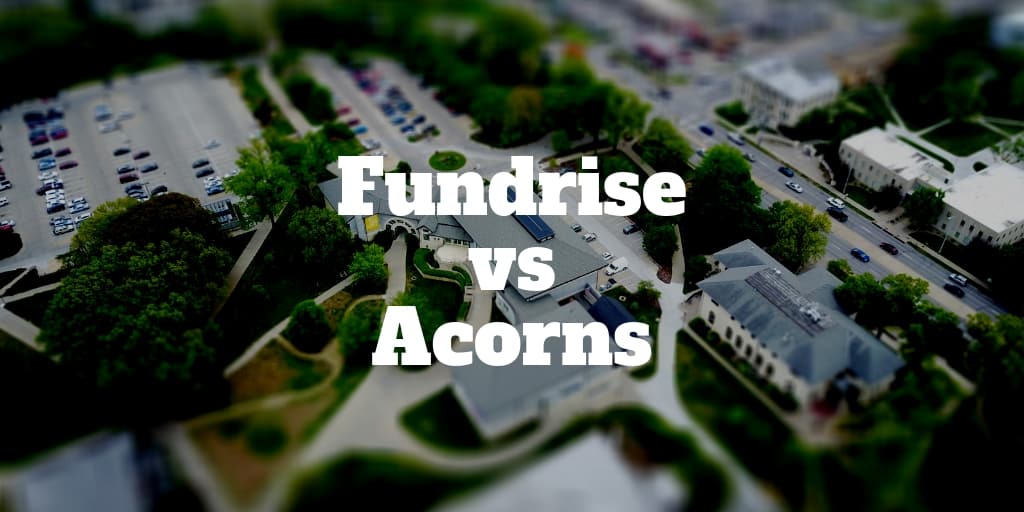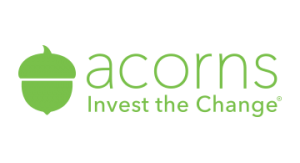

If making more money is your goal, Fundrise and Acorns can help, albeit in very different ways.
Fundrise is an online real estate crowdfunding site that pools money from lots of investors to buy commercial real estate and residential properties.
Acorns also invests money for clients but it does so via a mobile app that links to bank accounts. When you buy something, Acorns rounds-up the purchase to the nearest dollar and invests the ‘loose change’ to help you build a nest-egg for a rainy day.
In this Acorns vs Fundrise review, we compare these two very different investment alternatives on key factors, like fees and minimums so you know which matches your financial goals best.
Acorns vs Fundrise
Comparison
| Real Estate Investing | 
|
 |
| Reviews | Fundrise Review | Acorns Review |
| Minimum Investment | $500 | $5 |
| Dividend Frequency | Quarterly | N/A |
| Fees | 1% (annual fees) |
$1 per month or 0.25% (0.25% on balances over $5k) |
| Accounts Supported | Taxable + Retirement | Taxable + Retirement |
| Portfolio | Commercial + residential real estate | ETFs from 7 asset classes |
| Liquidity | ❌ | ✅ |
| Tax Strategy | ✅ | ❌ |
Why Choose Acorns or Fundrise
What Is Acorns?
Acorns is a combination of an automated savings app and a robo-advisor.
The app connects to your credit and debit cards so that each time you buy something, the ‘loose change’ is rounded up to the nearest dollar and automatically invested.
Your investment account is managed by computer algorithms much like any other robo-advisor, such as Betterment, would do.
What Is Fundrise?
Fundrise is an online real estate company that pools money from lots of investors to invest in commercial and residential real estate.
Although Fundrise offers a few different services, its primary offerings are REITs or real estate investment trusts, which offer passive income opportunities to investors.
Four portfolios are available through Fundrise:
- Starter
- Supplemental Income
- Balanced Investing
- Long-term Growth
Each portfolio has a mix of REITs and eFunds, which are used to buy land and develop properties for residential homeowners.
As you've no doubt seen on the news, our economy is facing uncertain times ahead. Inflation continues to skyrocket, the Fed has been failing us left and right, and the government is in shambles. As it stands, your money is not safe. But there is hope, the Inflation Survival Plan will tell you everything on how to not only survive, but actually thrive through this harsh economic change.
So don't wait until it's too late, act now and secure your future TODAY!
Fundrise vs Acorns Minimums
Acorns Investment Minimum
You can open an Acorns account without depositing a penny, however a $5 minimum is required to start investing.
You might be surprised how quickly your loose change builds up into a nice nest-egg when each transaction at a grocery store, gas station, or elsewhere sweeps money into an investment account.
Fundrise Investment Minimum
The Starter Portfolio at Fundrise has an investment minimum of $500 while the Supplemental Income, Balance Investing, and Long-term Growth plans all have $1,000 minimums.
➤ Free Guide: 5 Ways To Automate Your Retirement
Fundrise Fees vs Acorns Fees
Acorns Fees
Acorns charges management fees of $1 per month on taxable accounts and $2 per month on retirement accounts with balances under $5,000.
Once balances reach $5,000 or more, Acorns fees switch from a flat monthly rate to a percentage of assets; a 0.25% management fee applies then.
Fundrise Fees
Fundrise charges an advisory fee of 0.15% and a management fee of 0.85% on Starter Portfolios, Supplemental Income Plans, Balanced Investing Plans, and Long-term Growth Plans.
For clients with an IRA, a $75 annual fee is charged for each eREIT up to a maximum $200. It is paid to the Millennium Trust Company where IRA accounts are maintained.
Fundrise & Acorns Investment Strategy
Acorns Investments
Acorns portfolios are built using exchange-traded funds, or ETFs, from up to 7 asset classes.
They are made up of Vanguard funds and iShares, which generally have low expense ratios.
Your age, income, and time to retirement are factors that Acorns considers in selecting the mix of funds, whether Large Company Stocks, Real Estate Stocks, Small Company Stocks, Emerging Market Stocks, or International Large Company Stocks.
Fundrise Investments
Fundrise portfolios feature a mix of eREITs and eFunds as follows:
| Fundrise Portfolio | Investment Mix |
| Starter Portfolio |
|
| Supplemental Income Plan |
|
| Balanced Investing Plan |
|
| Long-term Growth Plan |
|
The #1 income play for 2023 is NOT a stock, bond or private company... Rather, it's a little-known alternative investment that could hand you big monthly income from oil and gas.
Find Out What It Is Right Here
Fundrise Returns vs Acorns Returns
Fundrise Returns
Since inception, Fundrise returns net of fees have been as follows:
| Year | Fundrise Performance |
| 2017 | 11.44% |
| 2016 | 8.76% |
| 2015 | 12.42% |
| 2014 | 12.25% |
Acorns Returns
Acorns performance returns vary for each client based on portfolio compositions.
The portfolios are largely tied to the performance of stock markets domestically and internationally.
Acorns vs Fundrise: Which Is Better?
| Acorns Wins | Fundrise Wins |
| ✅ Low Fees: Acorns is an especially good deal when account sizes reach $5,000 or more when management fees of 0.25% are charged. For smaller account sizes, the flat rate monthly fee may translate to higher percentage amounts. | ✅ Passive Income: Investors who want to receive income on a regular basis will be better served at Fundrise, which distributes dividends quarterly. |
| ✅ Automated Saving & Investing: Acorns puts your saving and investing on auto-pilot. Each time you use your credit card or debit card, you save a little and it is invested for you. | ✅ Real Estate vs Stock Market: Investors who wish to diversify risk away from the stock market and into real estate will find the mix of commercial real estate and residential property investments at Fundrise to be attractive alternatives. |
| ✅ Investment Minimum: It requires just $5 to start investing with Acorns, though you might be surprised how fast your nest-egg builds. | ✅ Diverse Portfolios: Fundrise provides four portfolios that cater to the needs of both new investors and experienced investors. |
| ✅ Mobile App: Acorns has a highly intuitive mobile app so you can link in to your investments on-the-go. | ✅ Self-directed IRA: IRA accounts are supported through the Fundrise platform. |
Acorns vs Fundrise
Comparison Summary
Fundrise and Acorns are both aimed at investors who like the idea of someone else managing their money, but they provide very different services.
Acorns is best for individuals looking to save more and it invests savings in a combination of stock market ETFs.
Fundrise targets investors who want to gain exposure to the real estate asset class but don’t want to own properties outright or manage them.
In reality, you could choose Acorns to help you squirrel away the loose change from everyday transactions and select Fundrise to invest a nest-egg you have already built.
No matter which you choose, the investment minimums are low and fees are competitive.
And Reuters magazine calls this type of trading "the new baby boomer hobby." An anonymous trader -- living at the base of the Smoky Mountains -- just released a free report revealing a step-by-step system to generating an extra $5,000 per month in income thanks to this trading strategy. The report is free until Sunday.
Click here for the FREE REPORT...









Leave a Reply